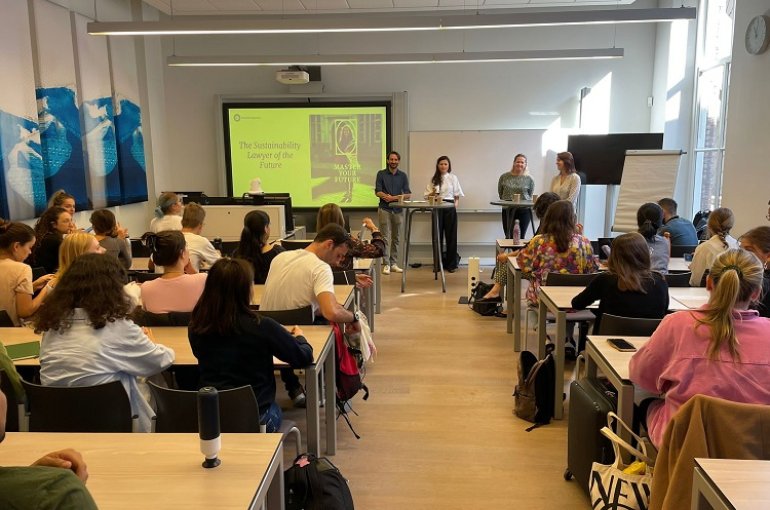Inspiration session for students: the sustainability lawyer of the future

To kick off the new master’s programme: Law and Sustainability in Europe, at Utrecht University, students were invited to an inspiring panel session with four professionals from policy, law, practice and academia. Students could ask questions on career trajectories, but also on their worries, hopes and dreams regarding sustainability and law.
Is the focus on sustainability a trend that will pass or is it here to stay?
, asked one worried student. Another wanted to know more about how changes in the law come about. Questions on necessary skills for the future-proof lawyer and its education were also discussed with the panel, whilst talking about sustainability in each of the panelist's day-to-day work.
The panel
The panel consisted of:
- Marie Keeling, research analyst, World Benchmarking Alliance
- Irina Buga, Senior Associate in International Arbitration and Lawyer at De Brauw Blackstone Westbroek
- Stefan Panhuijsen, managing director at Social Enterprise NL
- Matija Kajić, PhD Candidate in circular technologies and law at Utrecht University

A classroom of students from the EU and other parts of the world discussed the sustainability lawyer of the future in this inspiration session led by Willem Janssen, Associate Professor in European and Dutch Public Procurement Law and Seline Trevisanut, Professor in International Law and Sustainability at Utrecht University. This event is quite special
, said Willem Janssen, I didn't have a session like this, when I started my master's programme. We're glad that so many of you joined us today to discuss the sustainability lawyer of the future with this panel of experts.
The need for sustainability lawyers
Some companies are kicking the can down the road
, Marie Keeling said sternly, answering the question of the student that was scared about the future. And it does worry me as well, when sustainability targets are not met and it becomes a paper reality instead of real change that has to happen right now. In any case, we aim to close the accountability gap at the World Benchmark alliance by holding a mirror up to sectors, Sustainability professionals are key to driving transparency and behavioural change.
The focus on sustainability it is not a trend
, added Irina Buga, Particularly when you see the kind of huge long term investments and funding going towards sustainability and energy transitions. Companies that do not take it seriously will eventually lose out on their competitors in the market.
Sustainability is especially part of her pro bono work, explained Irina, for example for The Ocean Cleanup, a non-profit organization developing and scaling technologies to rid the oceans of plastic. There is no tailor-made legal framework yet for this kind of innovation, so The Ocean Cleanup needs to know: what rules apply to them? The sustainability lawyer of the future is instrumental in being able to navigate these uncertain waters.
Static versus ever-changing
Matija Kajić, who, as a researcher, stressed later in the panel that a major challenge in the field of law and sustainability is the need for stable laws in a static environment. The law calls for predictability and stability, something trustworthy and dependable for companies and citizens. On the other hand, sustainability, is an ever-changing field fueled by new insights and innovation. As a sustainability lawyer, you need to juggle these needs.
Stefan Panhuijsen was asked how his organisation, Social Enterprise NL, representing companies like Fairphone and Mud Jeans, is working on sustainability.We are supporting the front runners
he said, but we want to change policies as well.
Panhuijsen mentioned that a recent success was the legal announcement of the BVm, a new legal entity in the Netherlands. The BVm is a ‘societal limited’, a company with a social or societal purpose. Regulations and the playing field for companies with social or societal goals will be improved because of it. There will be a new legal form of social entrepreneurship. This is in part due to innovative professionals with sustainability in the back of their minds
, he mentioned.
Professional skills and Curiosity
What are the necessary skills for the sustainability lawyer of the future? The panel had lots to say: being able to work and think strategicly, being analytical and creative. Good lawyers bring details and provide structure, they are able to motivate a team and have people skills, managerial skills. If you're working on sustainability, you should be able to work with people from different disciplines, and be able to clearly communicate your own perspective on topics
, Marie Keeling added.
As a closing question, the panel was asked about what their advice would be for the students about to start their programme. Unanimously, they pointed towards the need to be curious and to let wonderment guide the students during this year. Why is something legislated like this in the EU? How come this law or policy is (in)effective in achieving its goals? How can we craft laws that work in practice and aid sustainable development?
Our Programme
Want to know more about the master programme ‘Law and Sustainability in Europe’? Have a look here at the programme for next year, and join us.

